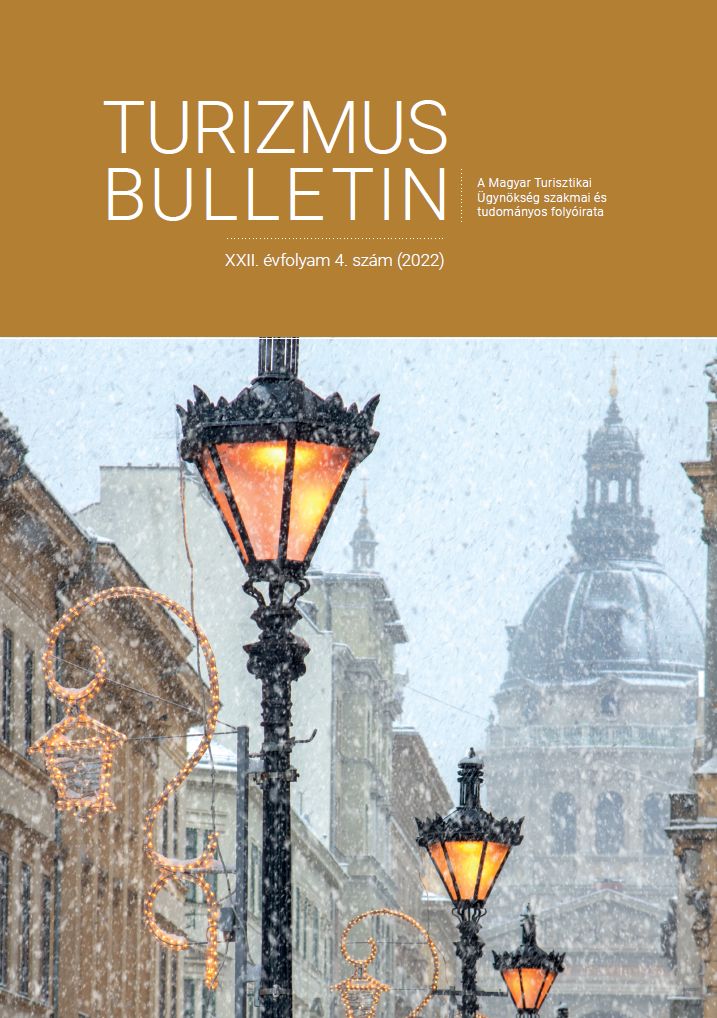Fundamental accessibility and technical accessibility in the dimensions of existence in travels – the meeting of two worlds leading to a paradigm shift
DOI:
https://doi.org/10.14267/TURBULL.2022v22n4.5Keywords:
philosophy, existential disability, functional accessibility, technical accessibility, accessible tourismAbstract
More and more studies are published nowadays on the diverse relationship between accessibility and tourism – at least tourism researchers are showing interests in the examination of the different aspects of accessibility. Service providers, however, still have much room for development in this respect. It is sad the examinations mentioned practically totally neglect both the (need of the) definition of accessibility from a philosophical perspective, so evidently its applicability in practice, and its empirically justifiable positive impacts are not discussed, either, though in the authors’ view it is a prerequisite for the realisation of traveller’s life rich in good and independent experiences. Little is said about the philosophy of accessibility which, in the authors’ opinion, is a prerequisite for the achieving adequate accessibility.
References
BÉKÉS V. (1997): A Hiányzó Paradigma. Latin Betűk Kiadó, Debrecen.
BERGSON, H. (2007): The Creative Mind. An Introduction to Metaphysics. Dover Publications, Inc., Mineola, NY, USA.
BYUNG-CHUL, H. (2020): The Disappearance of Rituals: A Topology of the Present. Polity Press: Cambridge, UK.
DELEUZE, G. – GUATTARI, F. (1996): What Is Philosophy? Columbia University Press, New
York, NY, USA.
DERRIDA, J. (1997): Of Grammatology. Corrected ed. The Johns Hopkins University Press, Baltimore, MD, USA.
DREYFUS, G. B. (1997): Recognizing Reality: Dharmakrti’s Philosophy and Its Tibetan Interpretations. State
University of New York Press, Albany, NY, USA.
FARKAS J. (2019): Az akadálymentesítés primátusa a turisztikai termékfejlesztésben. In: Irimiás A. – Jászberényi M. – Michalkó G. (szerk.): A turisztikai termékek innovatív fejlesztése. Akadémiai Kiadó, Budapest. pp. 146–156.
FARKAS J. (2020): A szimbiotikus embertől az egzisztenciálisan fogyatékos emberig. Educatio. 29(3). pp. 479–486. http://doi.org/10.1556/2063.29.2020.3.10
FARKAS J. (2021): Az egzisztenciális fogyatékosságban rejlő kiteljesedési lehetőségek – betekintés a fogalom jelentésvilágába. Doktori (PhD) értekezés. Budapesti Corvinus Egyetem, Budapest.
FARKAS J. – PETYKÓ CS. (2019): Utazás az akadálymentesség, a fogyatékosság és a fenntarthatóság multidiszciplináris és bölcseleti dimenzióiba. Turizmus Bulletin. 19(4). pp. 13–22.
FARKAS, J –RAFFAY, Z. – DÁVID, L. D. (2022): Fundamental Accessibility and Technical Accessibility in Travels – The Encounter of Two Worlds Which Leads to a Paradigm Shift. Sustainability. 14(7). 3765. https://doi.org/10.3390/su14073765
FEHÉR J. (1997): Nágárdzsuna, a Mahájána Buddhizmus Mestere. Farkas Lőrinc Imre Könyvkiadó, Budapest.
FEYERABEND, P. (2010): Against Method. 4th ed. Verso Books, New York, NY, USA.
GADAMER, H. G. (1989): Truth and Method. 2nd Revised Translation. Crossroad, New York, NY, USA.
GARFIELD, J. (1995): The Fundamental Wisdom of the Middle Way. N g rjuna’s M lamadhyamakak rik . Translated and Commentary by Jay L. Garfield. Oxford University Press, New York, NY, USA; Oxford, UK.
GONDA, T. (2021): Travelling habits of people with disabilities. GeoJournal of Tourism and Geosites.
(3). pp. 844–850. DOI: 10.30892/gtg.37315-717
HADOT, P. (2004): What is Ancient Philosophy? Harvard University Press, Cambridge, MA, USA.
HARARI, J. N. (2014): Sapiens. A Brief History of Humankind; HarperCollins Publishers, New York, NY, USA.
HEGEL, G. W. F. (1991): Elements of the Philosophy of Right. Cambridge University Press, Cambridge, UK.
HEIDEGGER, M. (1982): On the Way to Language. HarperCollins Publishers, New York, NY, USA.
HEIDEGGER, M. (2006): Sein und Zeit. Niemeyer, Tübingen.
JASPERS, K. (2003): Way to Wisdom: An Introduction to Philosophy. Yale University Press, New Haven, CT, USA.
JASPERS, K. (2008): Mi az Ember? – Filozófiai Gondolkodás Mindenkinek. Media Nova Kft., Budapest.
JÁSZBERÉNYI M. – KOTOSZ B. (2009): Közlekedési szokások vizsgálata Budapest délnyugati agglomerációjában. Statisztikai Szemle. 87(2). pp. 166–190.
JÁSZBERÉNYI M. – PÁLFALVI J. (2006): Közlekedés a gazdaságban. Aula Kiadó, Budapest.
KATONA F. (2014): Az Emberi kéz kultúrtörténete. Medicina Könyvkiadó Zrt., Budapest.
KOLAKOWSKI, L. (1991): Metaphysical Horror. The University Chicago Press, Chicago, IL, USA.
KROPOTKIN, P. A. (1902): Mutual Aid: a Factor of Evolution. McClure Phillips & Co., New York, NY, USA.
KUHN, T. S. (2012): The Structure of Scientific Revolutions. 4th ed. The University of Chicago Press, London, UK.
LAKATOS, I. – MUSGRAVE, A. (eds) (1968): Problems in the Philosophy of Science. Proceedings of the International Colloquium in the Philosophy of Science London, 1965. North- Holland, Amsterdam.
MAROSÁN B. P. (2004): Variációk az élettörténetre. Filozófiai Szemle. 4. pp. 495–523.
MICHALKÓ G. (2010): Boldogító utazás. MTA Földrajztudományi Kutatóintézet, Budapest.
MICHALKÓ G. (2016): Turizmológia. Akadémiai Kiadó Zrt., Budapest.
MISKOLCZI, M. – JÁSZBERÉNYI, M. – MUNKÁCSY, A. – NAGY, D. (2020): Accessibility of major Central and Eastern European cities in Danube cruise tourism. Deturope. 12(3). pp. 133–150. DOI:10.32725/det.2020.025
NIETZSCHE, F. (1978): Thus Spoke Zarathustra; Penguin Books: London, UK
NIETZSCHE, F. (1992): Ecce Homo: Wie Man Wird, Was Man Ist. Penguin Books, London, UK.
PLATÓN (1989): Az állam. Gondolat Kiadó, Budapest.
SZÁNTÓ, Z. O. – ACZÉL, P. – CSÁK, J. – SZABADHEGY, P. – MORGADO, N. – DELI, E. –SEBESTÉNY, J. – BÓDAY, P. (2020): Social Futuring Index. Concept, Methodology and Full Report 2020. Corvinus University of Budapest, Social Futuring Center, Budapest.
TÖNNIES, F. (1999): Community and Society. Routledge, London, UK.
WHITEHEAD, A. N. (1979): Process and Reality. The Free Press, New York, NY, USA.
ZIAREK, K. (2008): The Return to Philosophy? Or: Heidegger and the Task of Thinking. Journal of the British Society for Phenomenology. 39(3). pp. 249–259. https://doi.org/10.1080/00071773.2008.11006650.

